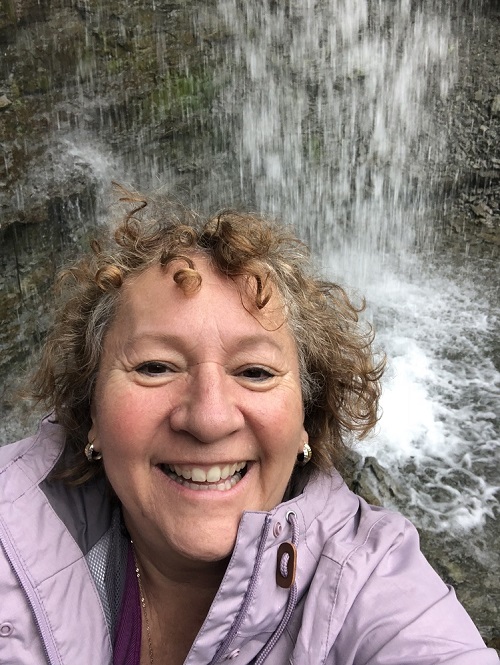Interview with ACBS Member Alison Benedict - August 2018
Interview with ACBS Member Alison Benedict - August 2018
 |
Welcome to a new feature of the ACBS monthly newsletter where we learn more about the inspiring work of ACBS members. In our first installment, Kate Morrissey Stahl interviews Alison Kiawenniserathe Benedict, MSW, RSW, a social worker practicing as a Provincial Aboriginal Training Coordinator in Kingston, Ontario, Canada.
Who are you?
My name is Alison Kiawenniserathe Benedict, MSW, RSW. I am a member of the Kanienkehaka Nation from Akwesasne, Wolf Clan.
I received my Master’s degree from the University of Michigan with a focus in clinical practice with children and youth, including school social work, and specialized training in child abuse and neglect. The foundation of my clinical practice originates from traditional teachings and teachings of the Peacemaker.
What got you started in social work?
Growing up, I was that kid that people talked to and confided in. In 1979, my family moved from Southern California to Akwesasne. It was a tremendous culture shock. In California, I did not experience racism. My teachers were kind to me and believed in me. I was able to ride my bike and go to the mall and beaches freely. When we moved to Akwesasne, there was no safe place. My love of learning was met with racism and sexism by teachers, principals, and administrators. Although there was some bullying by peers, it was not nearly as shocking as my experiences with adults. It was then that I began to understand the impact of trauma and social toxicity. At 15, as I sat with my friends who were contemplating living or dying, I learned how to stay and be with people who are suffering.
What connected you to the ACBS community?
Several years ago I attended a training in Toronto by Louise Hayes. It was incredible to learn that what I had been doing that had been so successful in my clinical work was an evidence-based practice! What joy! It was so validating. My clinical practice really bridged what I learned in traditional teachings and Western clinical practices. At work, my team was searching for evidence-based practices which could be used to help mental health and addiction workers across the province to support First Nations, Inuit, and Métis peoples. Although there are some culturally adapted practice modalities, there was not one that was as culturally congruent as ACT. Listening to the wisdom of our Elders really shows how much these ways of helping and being are aligned.
One of the other main reasons that I chose ACT is how it is beneficial to both helper and person seeking help. There has been such systemic and ongoing trauma in First Nations, Inuit, and Métis communities that no one is unaffected or untouched. The helpers are supporting others, but are also in dire need of support themselves. Our approach to all training, including ACT, is that the training itself is healing medicine.
How has the ACBS community supported work you want to do?
The Ontario ACBS has been a tremendous resource to my work. At the time, Dr. Kenneth Fung was the President of the Ontario Chapter. He has been instrumental in supporting this work and incredibly helpful with connecting me with others who can also support it. Both he and Mary Bell have travelled with me to various Northern communities to train people in ACT.
What would you like to see from ACBS as we move forward in working to reduce suffering in the world?
Making room for everyone to sit equally in voice, knowledge, and spirit. Walking our talk - doing, being, and including. What do we leave behind to the communities after our conference has concluded? What will be our legacy as we move forward? At this year's conference, I wanted to bring a value-based action to our association in the form of reconciliation. It took many months and advocates to support the opening and closing ceremony by the traditional Kanienkehake Faithkeeper, Otsi'tsaken:ra. The beautiful outcome was well received by many. Although, in fact, this was only a small piece of what I had hoped to realize. I originally wanted to arrange outreach to two First Nations communities, Kahnawake, which is just across the Mercier Bridge and Kanesatake, which is the site of the 1990 Oka crisis, about 40 minutes from Montreal. It would have been a valuable opportunity to actually engage and support communities to reduce suffering. We are not going to reduce suffering in the world if we stay in our safe places. We need to challenge ourselves to organize conferences in Africa, South or Central America, and other places. While there, we must connect to the land and the people, inviting them to share their wisdom with us so that we can connect and heal together. Thus, what I would like to see is that ACBS demonstrate inspiring leadership, make this an important priority, and engage all of us in an inclusive planning process to take committed action towards this vision of collective learning and healing.
What are the most important values that you bring to your work?
Love is at the core of all that I do. It is living the Ohen:ton Karihwatehkwen (words before all else that acknowledges and thanks all in Creation). Respect is the core value. The action is to do no harm to all in Creation. Respect is responsibility and accountability.
Where could we learn more about your work?
Alison Benedict
Provincial Aboriginal Training Coordinator
Aboriginal Engagement and Outreach
Provincial System Support Program
M. 416 452-2154
T. 613 546-4266 ext. 78063
Find out more about us: https://www.porticonetwork.ca/web/camh-aboriginalinitiatives
If you have a social worker you would like to have ACBS interview, please email Kate Morrissey Stahl at [email protected].
If you have an ACBS member that you would like to have ACBS interview, please email Laura Purcell at [email protected].